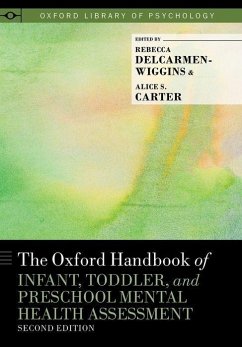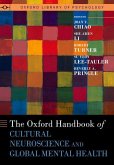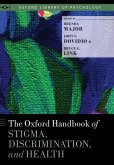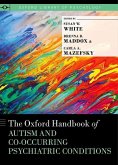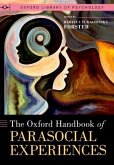The Oxford Handbook of Infant, Toddler, and Preschool Mental Health Assessment
Herausgeber: Delcarmen-Wiggins, Rebecca; Carter, Alice S
The Oxford Handbook of Infant, Toddler, and Preschool Mental Health Assessment
Herausgeber: Delcarmen-Wiggins, Rebecca; Carter, Alice S
- Gebundenes Buch
- Merkliste
- Auf die Merkliste
- Bewerten Bewerten
- Teilen
- Produkt teilen
- Produkterinnerung
- Produkterinnerung
Revision of: Handbook of infant, toddler, and preschool mental health assessment / edited by Rebecca DelCarmen-Wiggins, Alice Carter. 2004.
Andere Kunden interessierten sich auch für
![The Oxford Handbook of Cultural Neuroscience and Global Mental Health The Oxford Handbook of Cultural Neuroscience and Global Mental Health]() The Oxford Handbook of Cultural Neuroscience and Global Mental Health198,99 €
The Oxford Handbook of Cultural Neuroscience and Global Mental Health198,99 €![Oxford Handbook of Event-Related Potential Components Oxford Handbook of Event-Related Potential Components]() Oxford Handbook of Event-Related Potential Components257,99 €
Oxford Handbook of Event-Related Potential Components257,99 €![The Oxford Handbook of Positive Psychology The Oxford Handbook of Positive Psychology]() The Oxford Handbook of Positive Psychology226,99 €
The Oxford Handbook of Positive Psychology226,99 €![Oxford Handbook of Stigma, Discrimination, and Health Oxford Handbook of Stigma, Discrimination, and Health]() Oxford Handbook of Stigma, Discrimination, and Health236,99 €
Oxford Handbook of Stigma, Discrimination, and Health236,99 €![The Oxford Handbook of Autism and Co-Occurring Psychiatric Conditions The Oxford Handbook of Autism and Co-Occurring Psychiatric Conditions]() The Oxford Handbook of Autism and Co-Occurring Psychiatric Conditions197,99 €
The Oxford Handbook of Autism and Co-Occurring Psychiatric Conditions197,99 €![The Oxford Handbook of Parasocial Experiences The Oxford Handbook of Parasocial Experiences]() Rebecca Tukachinsky ForsterThe Oxford Handbook of Parasocial Experiences197,99 €
Rebecca Tukachinsky ForsterThe Oxford Handbook of Parasocial Experiences197,99 €![The Oxford Handbook of Psychology and Spirituality The Oxford Handbook of Psychology and Spirituality]() The Oxford Handbook of Psychology and Spirituality87,99 €
The Oxford Handbook of Psychology and Spirituality87,99 €-
-
-
Revision of: Handbook of infant, toddler, and preschool mental health assessment / edited by Rebecca DelCarmen-Wiggins, Alice Carter. 2004.
Hinweis: Dieser Artikel kann nur an eine deutsche Lieferadresse ausgeliefert werden.
Hinweis: Dieser Artikel kann nur an eine deutsche Lieferadresse ausgeliefert werden.
Produktdetails
- Produktdetails
- Oxford Library of Psychology
- Verlag: Oxford University Press Inc
- 2 Revised edition
- Seitenzahl: 520
- Erscheinungstermin: 30. Dezember 2019
- Englisch
- Abmessung: 259mm x 189mm x 42mm
- Gewicht: 1090g
- ISBN-13: 9780199837182
- ISBN-10: 019983718X
- Artikelnr.: 55314896
- Herstellerkennzeichnung
- Libri GmbH
- Europaallee 1
- 36244 Bad Hersfeld
- gpsr@libri.de
- Oxford Library of Psychology
- Verlag: Oxford University Press Inc
- 2 Revised edition
- Seitenzahl: 520
- Erscheinungstermin: 30. Dezember 2019
- Englisch
- Abmessung: 259mm x 189mm x 42mm
- Gewicht: 1090g
- ISBN-13: 9780199837182
- ISBN-10: 019983718X
- Artikelnr.: 55314896
- Herstellerkennzeichnung
- Libri GmbH
- Europaallee 1
- 36244 Bad Hersfeld
- gpsr@libri.de
Rebecca DelCarmen-Wiggins, PhD is a Health Scientist at the National Institutes of Health currently working to advance consideration of women's health and gender influences in research aimed at improving mental health. Dr. DelCarmen-Wiggins was previously the Chief of the Neurodevelopmental Disorders of Early Childhood Research Program in the Division of Developmental Translational Research at the National Institute of Mental Health. Trained as a clinical child psychologist, Dr. DelCarmen-Wiggins is also a licensed psychologist in Washington, DC and Maryland. She is the recipient of a National Service Research Award. She has conducted research studies in the area of infant attachment and has authored or coauthored a number of articles and book chapters in the topic of mental health in young children. Alice Carter, PhD is a Professor in the Psychology Department at the University of Massachusetts Boston working to advance early identification of psychopathology and neurodevelopmental disabilities as well as factors that place children at risk for difficulties in social and emotional development. Dr. Carter was previously an Associate Professor in the Department of Psychology at Yale University with a joint appointment in the Yale Child Study Center. A former fellow of Zero to Three, Dr. Carter is an author or co-author of over 200 articles and chapters and the co-author of the Infant-Toddler Social and Emotional Assessment (ITSEA) and the Brief Infant-Toddler Social and Emotional Assessment (BITSEA) with Margaret Briggs-Gowan, PhD. Her recent work is focused on addressing health disparities by improving early identification, evaluation, and treatment of infants and toddlers with autism spectrum disorders.
* Introduction
* Part I. Contextual Factors in Early Assessment
* Chapter 1: Cultural Perspectives for Assessing Infants and Young
Children
* Michelle Sarche, Monica Tsethlikai, Leandra Godoy, Robert Emde, and
Candace Fleming
* Chapter 2: Theoretical and Empirical Foundations for Early
Relationship Assessment
* in Evaluating Infant and Toddler Mental Health
* Roseanne Clark, Audrey Tluczek, Elizabeth C. Moore, and Amber L.
Evenson
* Chapter 3: Assessment of Early Parent Child Relationships
* Roseanne Clark, Audrey Tluczek, Elizabeth C. Moore, Amber L. Evenson
* Chapter 4: Apprehending the Interpersonal Context of Early Childhood
Development: A New Systemic Approach to Infant-Family Assessment
* James McHale and Susan Dickstein
* Chapter 5: Assessment in Early Care and Education Environments
* Laura Stout Sosinsky and Rachel A. Gordon
* Part II. Temperament and Regulation in Assessment of Young Children
* Chapter 6: Historical Background of the Study of Temperament and New
Perspectives on Assessment
* Samuel P. Putnam, Maria A. Gartstein, and Mary Rothbart
* Chapter 7: Distinguishing Temperament from Psychopathology
* David Rettew
* Chapter 8: Infant Temperament and Early Self-Regulation
* Patricia Tan and Pamela Marie Cole
* Part III. Early Problems and Disorders
* Chapter 9: The Preschool Age Psychiatric Assessment (PAPA): A
Structured Parent Interview for Assessing Psychiatric Symptoms and
Disorders in Preschool Children
* Helen Egger, Adrian Angold, Brian Small, and William Copeland
* Chapter 10: Quantitative and Multicultural Assessment of
Preschoolers' Behavioral, Emotional, and Social Problems: Multi
Cultural Perspectives
* Thomas Achenbach
* Chapter 11: Assessment of Attachment in Infancy and Early Childhood
* Neil W. Boris, Tessa Chesher, and Valerie Wajda-Johnson
* Chapter 12: Assessment of Sensory Processing Disorder: The Interplay
with Affect in the Context of Relationship
* Lucy Jane Miller, Molly Witten, and Roianne R. Ahn
* Chapter 13: Assessment of Language in Young Children
* Leslie Rescorla
* Chapter 14: Affective Disorders
* Cynthia Rogers and Joan L. Luby
* Chapter 15: Social Processes and Risk for Autism
* Cheryl Klaiman, Celine A. Saulnier, Emily Rubin, Katarzyna Chawarska,
and Ami Klin
* Chapter 16: The Contribution of Developmentally Sensitive Measurement
to Assessment of Disruptive Behavior in Young Children
* Sarah A.O. Gray and Lauren S. Wakschlag
* Chapter 17: Fear and Anxiety in Young Children and Their Assessment
* Suzanne Broeren, Jennifer Hudson, and Ronald M. Rapee
* IV. Translation and Varied Applied Settings for Assessment
* Chapter 18: A Community-Based Approach to Infant Mental Health
Assessment: Infants and Parents at High Psychosocial Risk
* Miri Keren and Ruth Feldman
* Chapter 19: Screening for Risk in a Primary Care Setting
* Lynne C. Huffman and Joan Baran
* Chapter 20: Second Stage Screening and Referral
* Rebecca B. Silver, Megan Beers, Leandra Godoy, and Susan Dickstein
* Epilogue and Future Directions
* Alice S. Carter and Rebecca Del Carmen-Wiggins
* Part I. Contextual Factors in Early Assessment
* Chapter 1: Cultural Perspectives for Assessing Infants and Young
Children
* Michelle Sarche, Monica Tsethlikai, Leandra Godoy, Robert Emde, and
Candace Fleming
* Chapter 2: Theoretical and Empirical Foundations for Early
Relationship Assessment
* in Evaluating Infant and Toddler Mental Health
* Roseanne Clark, Audrey Tluczek, Elizabeth C. Moore, and Amber L.
Evenson
* Chapter 3: Assessment of Early Parent Child Relationships
* Roseanne Clark, Audrey Tluczek, Elizabeth C. Moore, Amber L. Evenson
* Chapter 4: Apprehending the Interpersonal Context of Early Childhood
Development: A New Systemic Approach to Infant-Family Assessment
* James McHale and Susan Dickstein
* Chapter 5: Assessment in Early Care and Education Environments
* Laura Stout Sosinsky and Rachel A. Gordon
* Part II. Temperament and Regulation in Assessment of Young Children
* Chapter 6: Historical Background of the Study of Temperament and New
Perspectives on Assessment
* Samuel P. Putnam, Maria A. Gartstein, and Mary Rothbart
* Chapter 7: Distinguishing Temperament from Psychopathology
* David Rettew
* Chapter 8: Infant Temperament and Early Self-Regulation
* Patricia Tan and Pamela Marie Cole
* Part III. Early Problems and Disorders
* Chapter 9: The Preschool Age Psychiatric Assessment (PAPA): A
Structured Parent Interview for Assessing Psychiatric Symptoms and
Disorders in Preschool Children
* Helen Egger, Adrian Angold, Brian Small, and William Copeland
* Chapter 10: Quantitative and Multicultural Assessment of
Preschoolers' Behavioral, Emotional, and Social Problems: Multi
Cultural Perspectives
* Thomas Achenbach
* Chapter 11: Assessment of Attachment in Infancy and Early Childhood
* Neil W. Boris, Tessa Chesher, and Valerie Wajda-Johnson
* Chapter 12: Assessment of Sensory Processing Disorder: The Interplay
with Affect in the Context of Relationship
* Lucy Jane Miller, Molly Witten, and Roianne R. Ahn
* Chapter 13: Assessment of Language in Young Children
* Leslie Rescorla
* Chapter 14: Affective Disorders
* Cynthia Rogers and Joan L. Luby
* Chapter 15: Social Processes and Risk for Autism
* Cheryl Klaiman, Celine A. Saulnier, Emily Rubin, Katarzyna Chawarska,
and Ami Klin
* Chapter 16: The Contribution of Developmentally Sensitive Measurement
to Assessment of Disruptive Behavior in Young Children
* Sarah A.O. Gray and Lauren S. Wakschlag
* Chapter 17: Fear and Anxiety in Young Children and Their Assessment
* Suzanne Broeren, Jennifer Hudson, and Ronald M. Rapee
* IV. Translation and Varied Applied Settings for Assessment
* Chapter 18: A Community-Based Approach to Infant Mental Health
Assessment: Infants and Parents at High Psychosocial Risk
* Miri Keren and Ruth Feldman
* Chapter 19: Screening for Risk in a Primary Care Setting
* Lynne C. Huffman and Joan Baran
* Chapter 20: Second Stage Screening and Referral
* Rebecca B. Silver, Megan Beers, Leandra Godoy, and Susan Dickstein
* Epilogue and Future Directions
* Alice S. Carter and Rebecca Del Carmen-Wiggins
* Introduction
* Part I. Contextual Factors in Early Assessment
* Chapter 1: Cultural Perspectives for Assessing Infants and Young
Children
* Michelle Sarche, Monica Tsethlikai, Leandra Godoy, Robert Emde, and
Candace Fleming
* Chapter 2: Theoretical and Empirical Foundations for Early
Relationship Assessment
* in Evaluating Infant and Toddler Mental Health
* Roseanne Clark, Audrey Tluczek, Elizabeth C. Moore, and Amber L.
Evenson
* Chapter 3: Assessment of Early Parent Child Relationships
* Roseanne Clark, Audrey Tluczek, Elizabeth C. Moore, Amber L. Evenson
* Chapter 4: Apprehending the Interpersonal Context of Early Childhood
Development: A New Systemic Approach to Infant-Family Assessment
* James McHale and Susan Dickstein
* Chapter 5: Assessment in Early Care and Education Environments
* Laura Stout Sosinsky and Rachel A. Gordon
* Part II. Temperament and Regulation in Assessment of Young Children
* Chapter 6: Historical Background of the Study of Temperament and New
Perspectives on Assessment
* Samuel P. Putnam, Maria A. Gartstein, and Mary Rothbart
* Chapter 7: Distinguishing Temperament from Psychopathology
* David Rettew
* Chapter 8: Infant Temperament and Early Self-Regulation
* Patricia Tan and Pamela Marie Cole
* Part III. Early Problems and Disorders
* Chapter 9: The Preschool Age Psychiatric Assessment (PAPA): A
Structured Parent Interview for Assessing Psychiatric Symptoms and
Disorders in Preschool Children
* Helen Egger, Adrian Angold, Brian Small, and William Copeland
* Chapter 10: Quantitative and Multicultural Assessment of
Preschoolers' Behavioral, Emotional, and Social Problems: Multi
Cultural Perspectives
* Thomas Achenbach
* Chapter 11: Assessment of Attachment in Infancy and Early Childhood
* Neil W. Boris, Tessa Chesher, and Valerie Wajda-Johnson
* Chapter 12: Assessment of Sensory Processing Disorder: The Interplay
with Affect in the Context of Relationship
* Lucy Jane Miller, Molly Witten, and Roianne R. Ahn
* Chapter 13: Assessment of Language in Young Children
* Leslie Rescorla
* Chapter 14: Affective Disorders
* Cynthia Rogers and Joan L. Luby
* Chapter 15: Social Processes and Risk for Autism
* Cheryl Klaiman, Celine A. Saulnier, Emily Rubin, Katarzyna Chawarska,
and Ami Klin
* Chapter 16: The Contribution of Developmentally Sensitive Measurement
to Assessment of Disruptive Behavior in Young Children
* Sarah A.O. Gray and Lauren S. Wakschlag
* Chapter 17: Fear and Anxiety in Young Children and Their Assessment
* Suzanne Broeren, Jennifer Hudson, and Ronald M. Rapee
* IV. Translation and Varied Applied Settings for Assessment
* Chapter 18: A Community-Based Approach to Infant Mental Health
Assessment: Infants and Parents at High Psychosocial Risk
* Miri Keren and Ruth Feldman
* Chapter 19: Screening for Risk in a Primary Care Setting
* Lynne C. Huffman and Joan Baran
* Chapter 20: Second Stage Screening and Referral
* Rebecca B. Silver, Megan Beers, Leandra Godoy, and Susan Dickstein
* Epilogue and Future Directions
* Alice S. Carter and Rebecca Del Carmen-Wiggins
* Part I. Contextual Factors in Early Assessment
* Chapter 1: Cultural Perspectives for Assessing Infants and Young
Children
* Michelle Sarche, Monica Tsethlikai, Leandra Godoy, Robert Emde, and
Candace Fleming
* Chapter 2: Theoretical and Empirical Foundations for Early
Relationship Assessment
* in Evaluating Infant and Toddler Mental Health
* Roseanne Clark, Audrey Tluczek, Elizabeth C. Moore, and Amber L.
Evenson
* Chapter 3: Assessment of Early Parent Child Relationships
* Roseanne Clark, Audrey Tluczek, Elizabeth C. Moore, Amber L. Evenson
* Chapter 4: Apprehending the Interpersonal Context of Early Childhood
Development: A New Systemic Approach to Infant-Family Assessment
* James McHale and Susan Dickstein
* Chapter 5: Assessment in Early Care and Education Environments
* Laura Stout Sosinsky and Rachel A. Gordon
* Part II. Temperament and Regulation in Assessment of Young Children
* Chapter 6: Historical Background of the Study of Temperament and New
Perspectives on Assessment
* Samuel P. Putnam, Maria A. Gartstein, and Mary Rothbart
* Chapter 7: Distinguishing Temperament from Psychopathology
* David Rettew
* Chapter 8: Infant Temperament and Early Self-Regulation
* Patricia Tan and Pamela Marie Cole
* Part III. Early Problems and Disorders
* Chapter 9: The Preschool Age Psychiatric Assessment (PAPA): A
Structured Parent Interview for Assessing Psychiatric Symptoms and
Disorders in Preschool Children
* Helen Egger, Adrian Angold, Brian Small, and William Copeland
* Chapter 10: Quantitative and Multicultural Assessment of
Preschoolers' Behavioral, Emotional, and Social Problems: Multi
Cultural Perspectives
* Thomas Achenbach
* Chapter 11: Assessment of Attachment in Infancy and Early Childhood
* Neil W. Boris, Tessa Chesher, and Valerie Wajda-Johnson
* Chapter 12: Assessment of Sensory Processing Disorder: The Interplay
with Affect in the Context of Relationship
* Lucy Jane Miller, Molly Witten, and Roianne R. Ahn
* Chapter 13: Assessment of Language in Young Children
* Leslie Rescorla
* Chapter 14: Affective Disorders
* Cynthia Rogers and Joan L. Luby
* Chapter 15: Social Processes and Risk for Autism
* Cheryl Klaiman, Celine A. Saulnier, Emily Rubin, Katarzyna Chawarska,
and Ami Klin
* Chapter 16: The Contribution of Developmentally Sensitive Measurement
to Assessment of Disruptive Behavior in Young Children
* Sarah A.O. Gray and Lauren S. Wakschlag
* Chapter 17: Fear and Anxiety in Young Children and Their Assessment
* Suzanne Broeren, Jennifer Hudson, and Ronald M. Rapee
* IV. Translation and Varied Applied Settings for Assessment
* Chapter 18: A Community-Based Approach to Infant Mental Health
Assessment: Infants and Parents at High Psychosocial Risk
* Miri Keren and Ruth Feldman
* Chapter 19: Screening for Risk in a Primary Care Setting
* Lynne C. Huffman and Joan Baran
* Chapter 20: Second Stage Screening and Referral
* Rebecca B. Silver, Megan Beers, Leandra Godoy, and Susan Dickstein
* Epilogue and Future Directions
* Alice S. Carter and Rebecca Del Carmen-Wiggins

